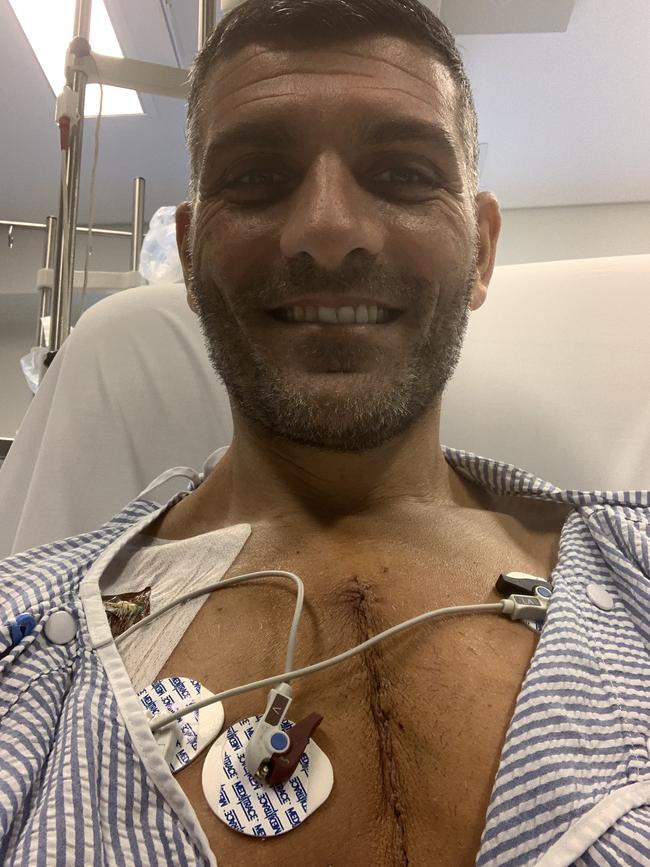Listen to your heart: How to know the early signs of an attack
Shane Warne’s sudden death at just 52 has many asking ‘how do you know if you are having a heart attack?’. See the early warning signs.
SmartDaily
Don't miss out on the headlines from SmartDaily. Followed categories will be added to My News.
When news of Shane Warne’s sudden death from a heart attack at just 52 broke a week ago, it plunged the world into shock.
In the aftermath of the spin king’s passing it was reported that he’d suffered chest pain and unexplained sweating beforehand.
However, in cardiovascular disease, there aren’t always clear warning signs such as an alarming chest clutch followed by a fall to the floor like you see in movies. Some symptoms don’t even involve your chest.
According to the Heart Foundation, cardiovascular disease affects more than four million Australians, and causes one in four deaths.
Natalie Raffoul, the Heart Foundation’s Healthcare Programs manager, says the disease is complex and highly individual, and there isn’t just one reason why someone develops it.
“For example, the build up of fatty plaque in our coronary arteries starts naturally from an early age,” she explains.
“It’s around adolescence, but how quickly it builds up determines when you develop heart disease in your lifetime.”
Raffoul adds that men tend to develop cardiovascular disease on average seven to 10 years younger than women, because women are protected by hormones until menopause.
Women are also less likely to have typical chest pains with a heart attack.

SILENT ATTACK
Many people having a heart attack don’t realise it at the time.
Dubbed a “silent” heart attack, it increases your risk of death and is often diagnosed later.
A key reason for this is mistaking symptoms for something else, or experiencing pain somewhere other than in the centre of the chest.
“Some people do experience a kind of cold sweat or a chill,” says Raffoul.
“And if they’re feeling faint or nauseous and vomiting, they may think it’s a virus they’ll get over.”
BUT I’M FIT …
Being fit, or even an elite athlete, doesn’t mean you’re without risk either. In 2017, Ironman Dean Mercer had his life cut short by a heart attack at age 47.
And just a few weeks ago the Danish soccer player, Christian Eriksen, played his first game in 266 days in England after suffering a heart attack at age 29 while competing in the 2020 Euros.

Socceroos legend, John Aloisi, knows this all too well.
In November 2019, age 43, he underwent lifesaving open heart surgery to repair a tear in his mitral valve, which was leaking blood.
“I was getting a little short of breath, but nothing major,” says Aloisi.
“I thought that maybe I was just getting on a little bit, but I decided to have a check-up anyway. It was a massive shock to discover I had a heart problem, having been a former athlete and still training.”
Aloisi’s condition had no apparent root cause other than bad luck, with no family history of heart disease.
It was a frightening episode from which it took the Western United F.C. coach nearly a year to recover.
“If you’re not feeling quite right, then just go get checked,” he advises.
“You know your own body better than anyone else.”
THE RISKS
According to the Heart Foundation, three-quarters of Australians are at risk of developing cardiovascular disease, and 1.4 million have a high chance of having a heart attack or stroke in the next five years.
But many people are unaware they even have a personal risk.
Raffoul says that the key to preventing heart disease, or doing something about it early, you need to know what your risk is to begin with.
CEO of the Royal Australian College of General Practitioners, Dr Bruce Willett, says that if you’re over 45, or over 30 and of Aboriginal or Torres Strait Islander descent, you should see a GP to have your heart health checked every couple of years.
“In addition to checking blood pressure, cholesterol and blood sugar levels, most GPs will also look at lifestyle factors, which would include diet, exercise, whether you smoke or not, alcohol consumption, and so on,” he says.
If you have a strong family history of heart disease, however, you should head for your GP at a younger age, and more frequently.
“Anyone over the age of 30 with a strong family history of premature heart disease should be checked annually,” he says.
“That’s anyone with first-degree relatives such as a mother, father, brother, or sister who’ve had heart disease, certainly under the age of 50, but even under the age of 60.”

SIGNS YOU MAY BE HAVING A HEART ATTACK
● Any chest discomfort including pain, tightness, or pressure, however mild.
● Nausea, indigestion, heartburn, or stomach pain.
● Pain that spreads from the chest to the arm and/or down the left side of the body.
● Pain that spreads from the chest to the throat or jaw.
● Feeling suddenly dizzy or light-headed, especially if accompanied by chest discomfort or a shortness of breath.
● Feeling fatigued after doing something you had no problem doing before, such as climbing the stairs.
● Breaking out in a cold sweat for no reason.
● Loud snoring which sounds like gasping or choking, which could be undiagnosed sleep apnoea.
● A persistent cough.
● Swollen legs, feet, or ankles.
● An irregular heart beat lasting more than a few seconds.
Source: Heart Foundation
More Coverage
Originally published as Listen to your heart: How to know the early signs of an attack
Read related topics:Shane Warne




